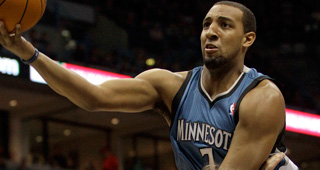Derrick Williams had just logged a little more than 10 minutes in a road loss to the Celtics when I made my way over to his locker. He knows what is coming and immediately tightens up.
He isn’t just a reserve forward for the Timberwolves, Williams is only 18 months removed from being the second overall pick of the 2011 NBA Draft. Kyrie Irving was the only player picked ahead of him, while a host of players selected after him – Brandon Knight, Kemba Walker, Kawhi Leonard, Kenneth Faried and others -- have had a much more immediate impact as professionals.
During his lockout-shortened rookie season, Williams played in all 66 games and even started 15 times. He didn’t shoot the basketball well, just 41.2 percent from the field and 26.8 percent from three, but finished the season averaging 8.8 points and 4.7 rebounds in a little under 22 minutes per game. With Minnesota projected to improve significantly this season, Williams figured to be a fixture in their growth.
That hasn’t always been the case.
After starting and contributing 23 points and seven rebounds in 37 minutes against the Warriors on Nov. 16, Williams didn’t even get off the bench in Minnesota’s next two games when Kevin Love first returned from a broken hand.
Rick Adleman has questioned whether Williams can handle playing small forward in the NBA, where wing players are required to handle the ball and defend the best athletes in the game. With Love back, time at power forward has been limited and Williams has seen a severe reduction in minutes.
In the eight games since the Golden State game, Williams has averaged just eight minutes – including three DNP-CDs. He’s shooting 54.5 percent during the stretch despite a smaller role and encouraged many with seven points and 10 rebounds in just 15 minutes against the Bucks on Nov. 30.
Any demotion is tough, but it’s even more difficult when you carry the expectations of being a former second overall pick. As I press record and ask Williams for a minute of his time, the wall he put up when I came into his line of sight remains.
“I don’t even know,” Williams replies when asked if he is able to gauge how many minutes he’ll play before a given game. “I don’t know how to answer that question.”
Point taken. It’s not going to do him any good to air out any issues with Minnesota’s front office or coaching staff through the media. But if the Timberwolves are giving him any sort of chance to carve out a role on what is expected to be a rising star in the Western Conference, he’s got to know what they want from him, right?
“I’m just trying to get in there and play my game,” says Williams when asked if Adleman is looking for anything in particular from him. “I know I can shoot, if I’m open I’m going to shoot it. I’m just doing the things that I know I can do. Shooting, rebounding and things like that.”
Conventional wisdom suggests that Williams should be getting the chance to do the things he knows he can do. He made the All-Pac-10 first team as a freshman at Arizona and was the Pac-10 Player of the Year as a sophomore before making the leap to the NBA. He wasn’t a huge difference-maker as a rookie, but earned a spot on the All-Rookie Second Team nonetheless.
Williams impressed scouts with a blend of strength and athleticism when he came out of Arizona. Still just 21, it’s hard to imagine that those tools have completely vanished, but they haven’t yet translated into the ability to play effectively on the wing. He’s dropped weight to better handle the three, but you can’t get by on body type alone.
After Williams determines that I’m not going to pester him in search of a negative comment about Adleman or the Timberwolves, he opens up a bit. I ask him about the pressure that comes with being a No. 2 pick in a culture that demands immediate results.
Without missing a beat, Williams convinces me he isn’t trying harder just because minutes have been scare lately and most expect him to already be the second-best player in his class.
“I try not to put pressure on myself at all,” says Williams. “If given the chance, I know I can perform and do what I do. There is a reason why I was drafted so high. That’s also why everybody is asking these questions and all that, but it’s just about getting an opportunity and a chance. I don’t know what else I could say about it. I’ve just got to keep playing.”
Williams has been putting in extra work in search of further development and a chance to play more minutes. As you might assume, the types of things he’s been working on are traits standard for a small forward.
“I’ve been doing a lot of shooting and ball-handling,” Williams explains. “It depends what coach I’m working with, but I try to work on a little bit of everything. I’m trying not to be just a catch-and-shoot guy, working on things like pull-ups jumpers. I’m trying to not limit myself.”
He hasn’t officially been an NBA player for a year, but limits have already been placed on Derrick Williams. Critics have lowered his high ceiling as a professional and Adleman has restricted his minutes.
As he sits at his locker, a home date against the Cavaliers next on the schedule, Williams leans back, guard completely down and looks me straight in the eye for the first time during our few minutes together.
“A lot of people know how good I can be and I expect the same from myself.”



